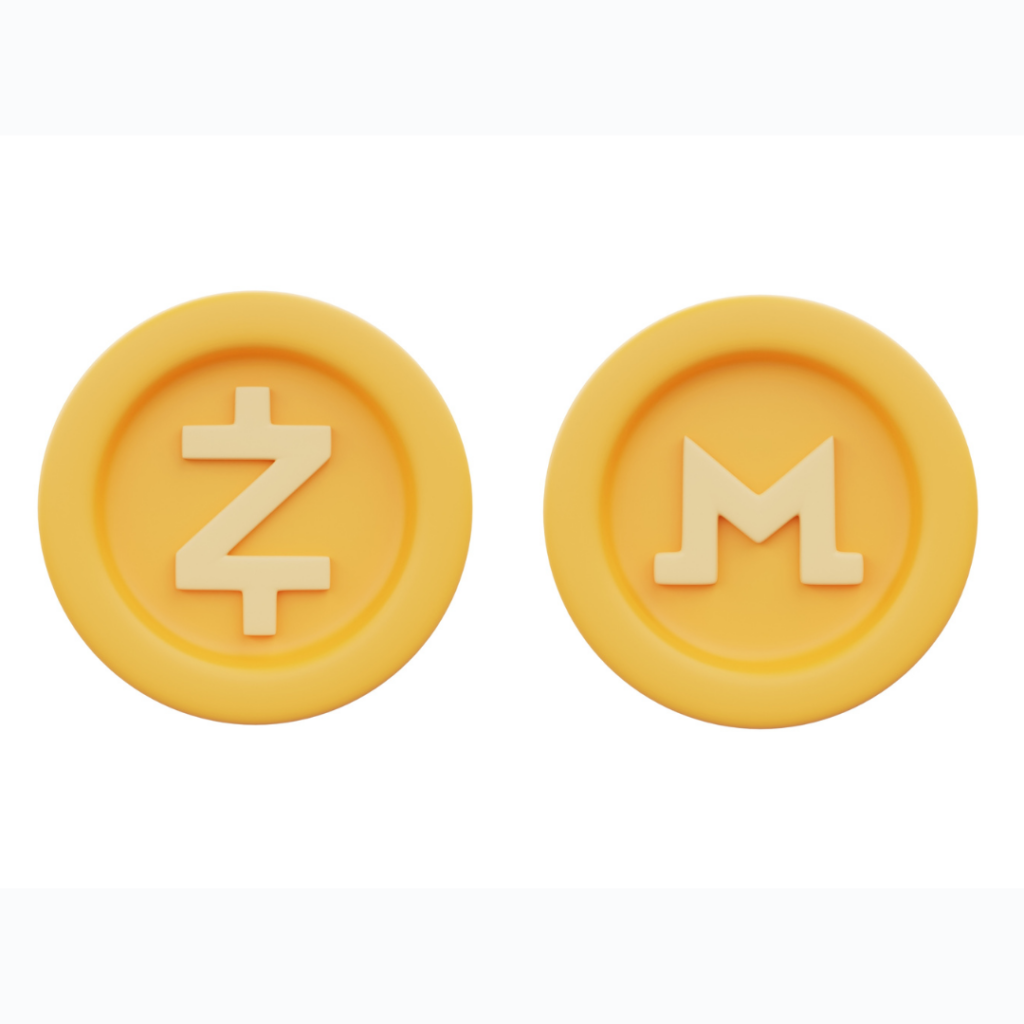Privacy Coins Explained: Are Monero and Zcash Truly Anonymous?
Privacy coins are designed with enhanced privacy features that keep your transactions private, hiding details like wallet addresses and transaction amounts to provide users with increased confidentiality and anonymity compared to standard cryptocurrencies.
It’s no secret that traditional fiat currencies often fall short when it comes to safeguarding our financial privacy. And while Bitcoin and other popular cryptocurrencies are often falsely advertised as the anonymous solution to this problem, the truth is Bitcoin transactions are easily traceable.
And that’s where privacy coins step in.
In this comprehensive guide, we’ll address everything from what privacy coins even are, how private they really are to their legality in different jurisdictions and potential alternatives.
What are Privacy Coins?
You may have heard that cryptocurrencies like Bitcoin and Ethereum are anonymous, but here’s the truth: they’re not as private as you might think. Anyone with an internet connection can follow the trail of transactions from one wallet to another. Not exactly the discreet financial solution you were sold, right?
That’s where privacy coins step in! Think of them as the cool, secretive cousins of regular cryptocurrencies. They function similarly but come with an extra layer of security that conceals transaction data and amounts.
While regular cryptocurrencies broadcast every transaction detail on public ledgers for all to see, privacy coins operate with a secret decoder ring, making it practically impossible to trace transactions. More on how these privacy coins work and the varying levels of anonymity they provide in a minute.
But first, what use do these anonymity-enhanced coins have?
It helps individuals and businesses dealing in cryptocurrencies to safeguard sensitive information about their finances from the public. Moreover, privacy coins can prove helpful in resisting potential authoritarian governments like the ones in North Korea or Afghanistan.
How Do Privacy Coins Work?
At the heart of privacy coins lies sophisticated technology and a series of cryptographic techniques designed to obscure transaction data and maintain confidentiality. Here are the main ones that most Anonymity-Enhanced Cryptocurrencies (AEC) use:
1. The first one is “ring signatures.” Instead of a single signer like in traditional digital signatures, ring signatures involve a set of potential signers, known as the ring, of which only one is the actual signer. This creates ambiguity, making it impossible to determine which member of the ring produced the signature.
2. Similar to “ring signatures,” “Coinjoin” is another technique that takes money from different people and mixes it all up in one big pool. That way, it’s tricky for anyone to figure out where the money originally came from.
3. Next up, we have “stealth addresses.” Imagine having a digital disguise for your wallet address. With stealth addresses, each transaction generates a new one-time address for the recipient, making it practically impossible to link multiple transactions to a single entity.
4. And lastly – “zk-SNARKs.” Don’t be intimidated by the name; it stands for Zero-Knowledge Succinct Non-Interactive Argument of Knowledge. In simple terms, zk-SNARKs uses complex mathematics and cryptography to prove a transaction is valid without revealing any sensitive details, like wallet addresses and transaction amounts.
While these techniques help obscure your transaction details, note that it still isn’t a hundred percent effective in maintaining your anonymity, which brings us to the question: are privacy coins really private?
Are Privacy Coins Really Private?

Not all privacy coins employ the same techniques. Hence, they provide varying degrees of privacy to suit different user preferences. Let’s take a closer look at some of the most popular privacy coins and understand how they manage to keep transactions anonymous and untraceable:
1. Monero (XMR): Monero is the most popular privacy coin in the crypto space, followed by Zcash.
It employs a unique privacy feature called Ring Confidential Transactions (RingCT) along with the ring signatures. RingCT obscures the transaction amounts, ensuring only the sender and receiver know the actual values. Additionally, Monero utilizes stealth addresses, making it virtually impossible to link the recipient’s address to their identity.
2. Zcash (ZEC): Zcash helps users maintain privacy and anonymity using the previously mentioned zk-SNARKs tool. This means that sender addresses, recipient addresses, and transaction amounts can all remain shielded from public view, providing greater anonymity.
It’s important to note that Zcash doesn’t process all its transactions with zk-SNARKs by default. Instead, it allows the users to choose whether to keep their transactions anonymous or not.
3. Dash (DASH): Dash employs CoinJoin, making it challenging to trace the original source of each transaction, thus improving privacy.
4. Litecoin (LTC): While Litecoin is not primarily a anonymity-enhanced coins, it has adopted the Mimblewimble protocol (a different blockchain altogether) through extension blocks. This brings enhanced privacy features like Confidential Transactions (CT), which hide transaction amounts, and CoinJoin to further obscure transaction origins to a rather ordinary cryptocurrency.
Are Privacy Coins Legal?
Several countries have imposed restrictions on privacy coins in an attempt to curb potential risks. For instance, South Korea and Australia have banned exchanges from listing certain privacy coins on their platforms. Japan went a step further and entirely prohibited buying, selling, or holding anonymous-enhanced coins, making privacy coins illegal in the country. More recently, Dubai also joined the list, outlawing Monero and Zcash.
Furthermore, there are reports hinting that the EU might follow suit with potential bans on these coins in the near future. Even in the United States, a prominent regulator, Christy Goldsmith Romero, has suggested the possibility of new laws addressing regulations surrounding privacy coins.
The landscape of privacy coins on exchanges is also subject to change due to regulatory pressures. Some major exchanges like Binance, Kraken, and Huobi have stopped offering privacy coins, particularly Monero and Zcash, in certain jurisdictions. In fact, some exchanges have entirely delisted these coins from their platforms.
However, several large crypto exchanges, such as Crypto.com, KuCoin, and OKEx, still provide access to privacy coins.
The legality of anonymity-enhanced coins can be a complex and region-specific matter. While you might find ways to buy privacy coins from decentralized exchanges regardless of your location, it’s essential to understand and adhere to your local regulations and not break any law.
What are the Risks of Privacy Coins?

The very feature that makes privacy coins appealing to many also makes them an attractive choice for those with malicious intent. Privacy coins can be misused for criminal activities such as money laundering, terrorist funding, hacking, and the trade of illegal goods and services on the dark web.
The anonymity they provide, Monero, in particular, can shield the identities of criminals, making it challenging for authorities to trace and track illicit transactions.
According to CNBC, Monero was the preferred cryptocurrency used in 44% of attacks in 2018, including the infamous WannaCry ransomware attack. Additionally, in 2019, the wife of a Norwegian millionaire was allegedly kidnapped, and the perpetrators demanded a ransom of $10 million worth of Monero.
However, it’s crucial to contextualize the risks of anonymity-enhanced coins.
Although privacy coins might seem like an ideal tool for money laundering and other financial crimes, data shows that they are not necessarily used more frequently than Bitcoin in illicit activities. Despite the privacy features, Bitcoin remains the dominant cryptocurrency used in illegal financial transactions, as per a report from 2019.
Nevertheless, the potential of privacy coins to facilitate illicit activities remains a matter of concern for regulators and law enforcement agencies.
Best Privacy Coins in 2023
Here are the most popular anonymity-enhanced coins in the market currently. We’ve discussed each coin in-depth in our best privacy coins of 2023 list.
- Monero (XMR)
- Zcash (ZEC)
- Dash (DASH)
- Oasis Network (ROSE)
- Decred (DCR)
- Horizen (ZEN)
- Verge (XVG)
- Bytecoin (BCN)
- Beldex (BDX)
Privacy Coins Alternatives
If you’re looking for financial confidentiality without necessarily diving into the realm of privacy coins, alternatives exist that achieve a similar purpose of concealing transaction details.
1. Crypto Mixers and Tumblers:
Crypto mixers and tumblers take your regular, traceable coins and shuffle them with those of other users. The result? Your transaction details, like addresses and amounts, become virtually indistinguishable from the pack. Check out our in-depth guide on crypto mixers and tumblers to know all about them.
3. Decentralized Finance (DeFi) Protocols:
DeFi has been a game-changer in the crypto world, and some DeFi protocols, like Incognito (PRV) or Secret Network (SCRT), offer privacy-focused services. These protocols enable users to engage in financial activities, such as lending, borrowing, and trading, while keeping transaction details obscured from public view.
While these alternatives are quite convenient, privacy coins still excel in prioritizing core privacy. Plus, they operate independently with dedicated blockchains, offering higher anonymity and functionality than alternatives like mixers and DeFi protocols.
FAQ
Do privacy coins have a future?
As privacy concerns grow, demand for confidential financial transactions is likely to persist. However, the trajectory of anonymity-enhanced coins could be influenced by regulatory dynamics and technological advancements.
What is the Safest Privacy Coin?
Monero is probably the safest privacy coin due to its advanced cryptographic techniques like Ring Confidential Transactions (RingCT) and stealth addresses, along with its decentralized nature and active development community.
But bear in mind that no cryptocurrency is entirely immune to vulnerabilities.
Which privacy coin is best?
In terms of overall privacy and anonymity, Monero is the best privacy coin. However, Zcash offers a more holistic solution by allowing users the choice to turn off privacy features if needed.
Is Zcash better than Monero?
Determining whether Zcash is better than Monero depends on specific preferences and needs. While both have their strengths, such as Zcash’s flexibility and Monero’s widespread adoption, ultimately, it comes down to security, community support, and alignment with individual privacy needs.
Is it illegal to buy Monero?
As of writing this, privacy coins are illegal to buy in Japan and Dubai, while other countries, like South Korea and Australia, have banned exchanges from listing Monero, Zcash, and other anonymity-enhanced coins.
Is Bitcoin a private currency?
Contrary to common perception, Bitcoin is not a private currency. It operates on a public blockchain, where all transactions are visible to anyone. While transactions are pseudonymous, meaning they’re linked to addresses rather than personal information, they are still traceable.